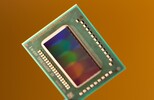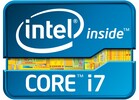Intel Core i7-2860QM vs Intel Core i7-2629M
Intel Core i7-2860QM
► remove from comparison
Der Intel Core i7-2860QM ist ein Quad-Core Prozessor basierend auf der Sandy Bridge Architektur und Nachfolger des Core i7-2820QM. Im 3. Quartal 2011 ist er der zweitschnellste mobile Prozessor für Notebooks hinter dem i7-2960XM und überholt sogar den alten Spitzenreiter Core i7-2920XM. Er bietet 4 Kerne und kann dank Hyperthreading 8 Threads gleichzeitig bearbeiten. Im Vergleich zu den Clarksfield Quad-Cores wird der 2860QM bereits in 32nm gefertigt. Der langsamere 2760QM ist etwas geringer getaktet und bietet deutlich weniger Level 3 Cache (6 vs. 8 MB).
Sandy Bridge ist eine Weiterentwicklung der Arrandale Architektur. Neben Optimierungen sind besonders die neuen 256 Bit AVX Instruktionen im CPU Teil und der verbesserte Turbo 2.0 erwähnenswert. Weiterhin sind nun ebenfalls AES Funktionen und ein verbesserter Dual Channel DDR3 Speichercontroller direkt im Prozessor integriert.
Die intergrierte Intel HD Graphics 3000 Grafikkarte ist direkt in der CPU untergebracht und teilt sich mit dieser den Level 3 / Last Level Cache. Dadurch sinkt zwar die Prozessorleistung etwas bei aktivierter Grafik, die Grafikleistung ist jedoch deutlich besser als bei der alten Intel HD Graphics und auf dem Niveau einer Nvidia Geforce 310M Einstiegsgrafikkarte. Dank Turbo Boost wird sie im 2860QM von 650 MHz bis 1300 MHz getaktet.
Die Performance liegt durch den höheren Turbo-Takt etwas über dem ehemaligen Spitzenreiter Core i7-2920XM. Dieser bietet jedoch einen freien Multiplikator zur einfachen Übertaktung, aber auch eine höhere TDP. Dadurch ist die Quad Core CPU für alle Anwendungen und Spiele ausreichend schnell und eignet sich auch für Rendering und anspruchsvollen Videoschnitt.
Im Vergleich zu den Sandy Bridge Doppelkernprozessoren sind die Quad Core CPUs mit einer höheren TDP spezifiziert und eignen sich daher nur für große Notebooks. Im Vergleich zu den Clarksfield CPUs beinhaltet die TDP jedoch nun auch die Grafikkarte, wodurch sie im Schnitt sparsamer wurden.
Intel Core i7-2629M
► remove from comparison
Der Intel Core i7-2629M ist ein stromsparender LV (Low Voltage) Prozessor für Notebooks. Mit 2.1 GHz Basistaktfrequenz ist er relativ gering getaktet, jedoch kann er dank Turbo Boost bis zu 3 GHz hochtakten (2.7 Ghz bei Belastung beider Kerne). Durch die Unterstützung von Hyperthreading können 4 Threads gleichzeitig bearbeiten. Verglichen mit dem namens-ähnlichen Core i7-2620M, ist der 2629M deutlich langsamer (aufgrund des geringeren Grundtaktes), verbraucht jedoch weniger Strom (25W vs. 35W TDP).
Sandy Bridge ist eine Weiterentwicklung der Arrandale Architektur. Neben Optimierungen sind besonders die neuen 256 Bit AVX Instruktionen im CPU Teil und der verbesserte Turbo 2.0 erwähnenswert. Weiters sind nun ebenfalls AES Funktionen und ein verbesserter Dual Channel DDR3 Speicherkontroller für max. 8 GB DDR3-1333MHz direkt im Prozessor integriert.
Die intergrierte DirectX 10 fähige Intel HD Graphics 3000 Grafikkarte ist direkt in der CPU untergebracht und teilt sich mit dieser den Level 3 / Last Level Cache. Dadurch sinkt zwar die Prozessorleistung etwas bei aktivierter Grafik, die Grafikleistung ist jedoch deutlich besser als bei der alten Intel HD Graphics in ULV Notebooks. Vergleichen mit den stärkeren 35 Watt Doppelkernprozessoren ist die Grafikleistung jedoch aufgrund der geringeren Basis-Taktfrequenz etwas schlechter (500 versus 650 MHz Basistakt).
Die Performance liegt dank der verbesserten Architektur und des überarbeiteten Turbo Boost etwas oberhalb einer ähnlich getakteten Arrandale CPU. Dadurch sollte die Leistung etwas oberhalb eines Core i3-380M liegen (falls der Turbo Boost dank ausreichend Kühlung gut funktioniert).
Die Sandy Bridge Doppelkernprozessoren beinhalten im angegebenen TDP von 25 Watt auch die Grafikkarte und den Speicherkontroller. Durch den Turbo Boost 2.0 wird der TDP jedoch unter Last eher ausgenutzt.
| Model | Intel Core i7-2860QM | Intel Core i7-2629M | ||||||||||||||||||||||||||||||||||||||||||||||||||||||||||||||||||||||||||||||||||||||||||||||||||||||||||||||||||||||||||||||||||||||||||||||||
| Codename | Sandy Bridge | Sandy Bridge | ||||||||||||||||||||||||||||||||||||||||||||||||||||||||||||||||||||||||||||||||||||||||||||||||||||||||||||||||||||||||||||||||||||||||||||||||
| Series | Intel Core i7 | Intel Core i7 | ||||||||||||||||||||||||||||||||||||||||||||||||||||||||||||||||||||||||||||||||||||||||||||||||||||||||||||||||||||||||||||||||||||||||||||||||
| Serie: Core i7 Sandy Bridge |
|
| ||||||||||||||||||||||||||||||||||||||||||||||||||||||||||||||||||||||||||||||||||||||||||||||||||||||||||||||||||||||||||||||||||||||||||||||||
| Clock | 2500 - 3600 MHz | 2100 - 3000 MHz | ||||||||||||||||||||||||||||||||||||||||||||||||||||||||||||||||||||||||||||||||||||||||||||||||||||||||||||||||||||||||||||||||||||||||||||||||
| L1 Cache | 256 KB | 128 KB | ||||||||||||||||||||||||||||||||||||||||||||||||||||||||||||||||||||||||||||||||||||||||||||||||||||||||||||||||||||||||||||||||||||||||||||||||
| L2 Cache | 1 MB | 512 KB | ||||||||||||||||||||||||||||||||||||||||||||||||||||||||||||||||||||||||||||||||||||||||||||||||||||||||||||||||||||||||||||||||||||||||||||||||
| L3 Cache | 8 MB | 4 MB | ||||||||||||||||||||||||||||||||||||||||||||||||||||||||||||||||||||||||||||||||||||||||||||||||||||||||||||||||||||||||||||||||||||||||||||||||
| Cores / Threads | 4 / 8 | 2 / 4 | ||||||||||||||||||||||||||||||||||||||||||||||||||||||||||||||||||||||||||||||||||||||||||||||||||||||||||||||||||||||||||||||||||||||||||||||||
| TDP | 45 Watt | 25 Watt | ||||||||||||||||||||||||||||||||||||||||||||||||||||||||||||||||||||||||||||||||||||||||||||||||||||||||||||||||||||||||||||||||||||||||||||||||
| Transistors | 995 Million | 624 Million | ||||||||||||||||||||||||||||||||||||||||||||||||||||||||||||||||||||||||||||||||||||||||||||||||||||||||||||||||||||||||||||||||||||||||||||||||
| Technology | 32 nm | 32 nm | ||||||||||||||||||||||||||||||||||||||||||||||||||||||||||||||||||||||||||||||||||||||||||||||||||||||||||||||||||||||||||||||||||||||||||||||||
| Die Size | 216 mm2 | 149 mm2 | ||||||||||||||||||||||||||||||||||||||||||||||||||||||||||||||||||||||||||||||||||||||||||||||||||||||||||||||||||||||||||||||||||||||||||||||||
| max. Temp. | 100 °C | 100 °C | ||||||||||||||||||||||||||||||||||||||||||||||||||||||||||||||||||||||||||||||||||||||||||||||||||||||||||||||||||||||||||||||||||||||||||||||||
| Features | HD Graphics 3000, DDR-1333 Memory Controller, HyperThreading, AVX, Quick Sync, Virtualization | HD Graphics 3000 500-1100MHz, integrated DDR3-1333 memory controller, Virtualization, Trusted Execution, Hyper-Threading, Turbo Boost 2.0 | ||||||||||||||||||||||||||||||||||||||||||||||||||||||||||||||||||||||||||||||||||||||||||||||||||||||||||||||||||||||||||||||||||||||||||||||||
| iGPU | Intel HD Graphics 3000 (650 - 1300 MHz) | Intel HD Graphics 3000 (500 - 1100 MHz) | ||||||||||||||||||||||||||||||||||||||||||||||||||||||||||||||||||||||||||||||||||||||||||||||||||||||||||||||||||||||||||||||||||||||||||||||||
| Architecture | x86 | x86 | ||||||||||||||||||||||||||||||||||||||||||||||||||||||||||||||||||||||||||||||||||||||||||||||||||||||||||||||||||||||||||||||||||||||||||||||||
| $568 U.S. | $311 U.S. | |||||||||||||||||||||||||||||||||||||||||||||||||||||||||||||||||||||||||||||||||||||||||||||||||||||||||||||||||||||||||||||||||||||||||||||||||
| Announced | ||||||||||||||||||||||||||||||||||||||||||||||||||||||||||||||||||||||||||||||||||||||||||||||||||||||||||||||||||||||||||||||||||||||||||||||||||
| Socket | BGA1023 | |||||||||||||||||||||||||||||||||||||||||||||||||||||||||||||||||||||||||||||||||||||||||||||||||||||||||||||||||||||||||||||||||||||||||||||||||
| Manufacturer | ark.intel.com |
Benchmarks
Average Benchmarks Intel Core i7-2860QM → 0% n=0
* Smaller numbers mean a higher performance
1 This benchmark is not used for the average calculation












